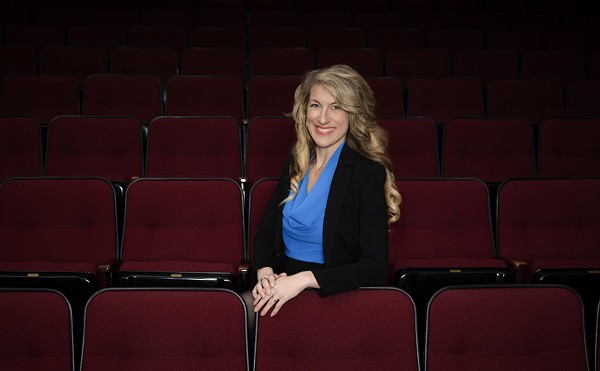Perhaps Daniels lacks the star power to draw the sneak-preview crowd, or not enough invitations made it to their recipients, or few people were up for a Tuesday-night flick about dueling vacuum-cleaner salesmen. Whatever the reason, it's a disappointing turnout. About twenty people finally make their way into the theater, most of them media types.
Daniels appears in the lobby for autographs and handshakes. The fair-haired actor is 46 now, past the youthful roles that made him, if not a star, a sought-after working actor, that high accolade for a professional who turns in quality performances in film after film. Terms of Endearment, The Purple Rose of Cairo, Something Wild -- he compiled a remarkable string of films and performances in the '80s -- and giant box-office success with the Farrelly brothers and Jim Carrey in Dumb and Dumber in the '90s. Arachnophobia, Pleasantville, Blood Work, The Hours, Gods and Generals: Daniels continues to have a diverse and interesting career. He's obviously any director's go-to guy.
Tonight, however, he's looking a little the worse for wear. He's schlepping Super Sucker around the Midwest for preview screenings: St. Louis tonight, Kansas City tomorrow night, all leading up to an opening on 150 screens around the upper Midwest on January 24, Super Bowl weekend. Word of mouth may be what Super Sucker needs to succeed, but there are few mouths here to pass the word along.
Daniels' characters often convey a Midwestern openness -- honest, handsome, earnest -- on the surface, combined with darker ambitions beneath. He's a complex, appealing, sexy actor. Tonight he's a weary salesman, diffident, perhaps aware that the goods he's brought are going to be a hard sell.
A tall, attractive redhead in her thirties walks up to Daniels, who stands, reserved, in a long black leather coat.
"I confess I first developed a crush on you watching Terms of Endearment," she tells him.
"Ah yes," Daniels replies drolly, "the cheating husband."
She laughs: "I'm afraid my husband says I can't kiss you."
Daniels smiles: "That's good, because my lawyer says I can't kiss you."
This is the wittiest exchange of the evening. Nothing so good appears in Super Sucker.
Daniels' second writer/director/actor vehicle, produced by his own Purple Rose Films, Super Sucker takes one lame adolescent joke and tries to extend it throughout the feature-length comedy. Fred Barlow (Daniels) competes with his hated rival, Winslow Schnaebelt (Harve Presnell), to become the sole distributor of the Super Sucker home-cleaning system in fictional Johnson City, Michigan (played by Jackson, Michigan, the birthplace of the Republican Party). The town's hotel is called the Grand Johnson.
Barlow's team is losing the battle, knowing if they do, they forfeit the distributorship. Barlow comes home despondent one afternoon, only to hear the vacuum cleaner upstairs, as well his wife -- making noises not usually associated with housecleaning.
Yes, Mrs. Barlow is having sex with her Super Sucker -- or, more accurately, with the "homemaker's little helper" attachment and the special "nap nipper."
Barlow, instead of standing aghast at the sight of his wife raunching out with a household appliance, begins to take a good look at that attachment, then figures out how to sell it.
Super Sucker relies on outrageous situations, physical comedy and bawdy humor. Although Daniels' company -- many plucked from his own Purple Rose Theatre -- perform diligently as an ensemble, the jokes are hollow, the battles between rival salesmen have all the originality of a food fight (one actually takes place) and the premise itself, in a time when sex toys (and vacuum cleaners) are just a Web site away, implies a lack of sophistication in the heartland, which goes against Daniels' film-marketing scheme.
At the conclusion of the screening, which garners polite chuckles from the audience -- at best, Kim Tucci, Missouri Film Commission board chairman, emits a few loud, unnerving guffaws -- Daniels comes out and talks about how he has focused distribution in the Midwest, rather than the coasts, because "Midwesterners will get it."
The next morning, at a roundtable interview at the Mayfair Hotel, Daniels is unclear about what Midwesterners might get that those in LA and New York don't. Before 10 a.m. Daniels looks sleepy but affable, with soft puppy-dog eyes. There is a Midwestern sensibility, Daniels contends, "and I don't know what it is. It's this lifelong quest to try to pinpoint it. If I ever did find out, I probably wouldn't be able to do it anymore. But I think it has something to do with the veneer of normalcy across the front of us and, underneath, that there are dark sides."
Daniels grew up in Michigan and makes his home there. He displays some of those supposedly Midwestern values as he talks about his sons' high-school varsity-hockey schedule, which will determine Daniels' workload this winter. He says he told his agents, "I'm not going to miss a game. Don't call me."
Daniels' theater company is in Michigan, where he produces his own plays, writing specifically for the ensemble he's put together, as well as for the audience he's developed. Pulitzer Prize-winning playwright Lanford Wilson gives his plays an opening run at the Purple Rose. Book of Days began there before moving to the St. Louis Repertory Theatre and, eventually, to Broadway. Daniels' career began off-Broadway with the Circle Repertory Company, where Wilson was principal playwright and actors such as William Hurt and Christopher Reeve honed their craft in the 1970s.
For now, Daniels is drawn to his home locale for his films. "Whether it's a drier sense of humor," he says, further considering a definition of Midwestern, "I don't know. It's interesting. I watched About Schmidt [written and directed by Nebraskan Alexander Payne]. The guys that sit there and go, 'Hey, how about this weather? Is it hot enough for you?' It exists. [About Schmidt] was loaded with that, and it still felt like outside looking in at us.
"It's in my plays. It's in Super Sucker. It's kind of inside out. We're in the middle of it. There is a guy who's nuts: the Amway salesman on crack, like Fred [Barlow]. I talked to him. Whether they can understand that on both coasts, or whether they understand it more here; whether we're more open to heightened characters, I don't know. I don't know."
"But I do know we get the jokes," Daniels says with Midwestern indignation. "New York doesn't think we get the jokes. We get the jokes -- and they don't all have to be about Newark."
But they don't all have to be about vacuum cleaners as sex toys, either.
Over the years, Daniels has worked with exceptional directors, and he alludes to a few whom he's watched and learned from -- Woody Allen, Jonathan Demme, Clint Eastwood -- as well as those of his own generation who have chosen to take control of their films. "Stanley Tucci -- I got to meet Stanley about three or four months ago. Big Night was an influence: Here he is writing, acting, directing. Tim Robbins did it with Bob Roberts."
Daniels mentions a role model from another Hollywood era, the great writer/director Preston Sturges. Daniels says Hollywood, and the indie scene as well, cares more about "serious" films -- those are the ones that win the Oscars. But, he says, "I know it's not taken seriously and I know it's not important, but there are people out there that love to laugh. I like being one of the guys that can do that."
For a moment, Daniels sounds just like one of Sturges' characters, as in Sullivan's Travels. Sturges, another Midwesterner, created stories and characters that were both complex and funny, outrageously so. He made 'em laugh from coast to coast.





